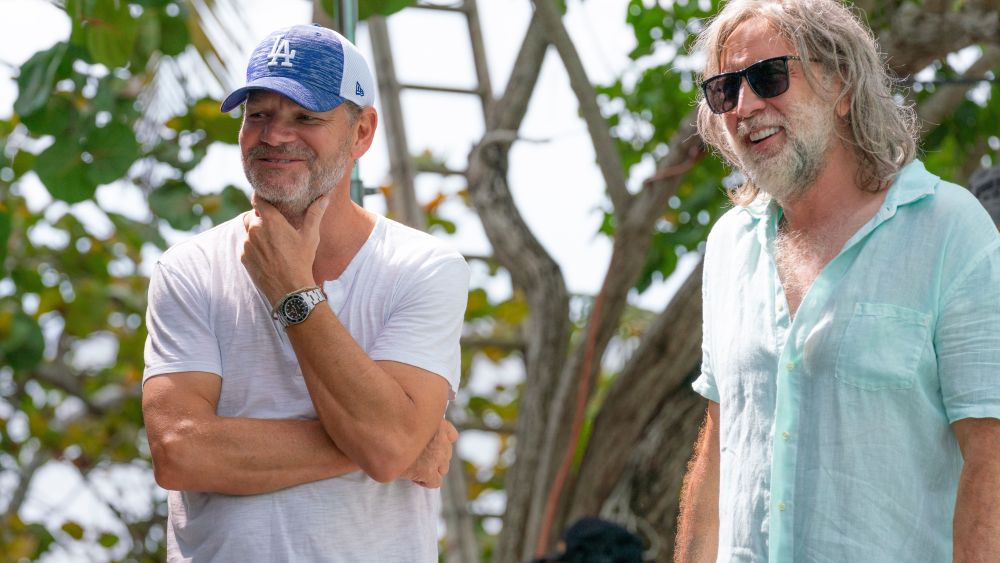Nicolas Cage is one of the most admired actors in the world, and given the lore surrounding his unique personality and spectrum of roles, ranging from award-winning to eccentric, he’s always a point of interest in Hollywood. In the upcoming film “The Retirement Plan,” debuting theatrically on Sept. 15, Cage plays a retired government assassin with a violent set of skills, who must protect his estranged daughter and grandchild (played by Ashley Greene and Thalia Campbell) after they get tangled up with some very bad men (including Ron Perlman and Jackie Earle Haley). Writer and director Tim Brown spoke with Variety about the art of directing and collaborating with Cage.
What were your expectations once you learned that Nicolas Cage booked the role of Matt in your movie?
My expectation was he was going to be a complete pro and just have everything down. The day that I have to have an ego and someone who’s trouble or really wants to push against what I’m thinking…I don’t know what would happen, I’d probably flip out [laughs]. He came in fully prepared. Whatever my expectations, he blew them away tenfold.
Is he the kind of actor who wants to collaborate with you on ideas or just stick to the script?
I think if I was preparing a meal, he wouldn’t touch the main ingredients, but he would come in and say, “If you add a little cumin to this, it’s going to change the whole thing.” I call it the “Nick Cage spice” — he would add something in there, and it’s because of an encyclopedic knowledge of cinema. He’s always pulling from a file. I don’t think it’s any different than how Quentin Tarantino pulls from files when he thinks of cinema and new ideas, because new ideas are just old ideas, recycled and refigured out and repositioned.
When I first talked to him was when he sent me notes on the script — only on his dialogue, nothing else. He’s a tremendous dialogue editor, in that I would over-phrase something, and less is always more. He would say something with a look. He would rewrite a line and say, “Instead of saying a line, what if I just gave her a look?” So he adds these elements where he’ll change the script, but he won’t change the line.
Cage is such a film historian. Were there any characters or actors he looked at as a guiding light from the past while playing this character?
Love Film & TV?
Get your daily dose of everything happening in music, film and TV in Australia and abroad.
It was actually Leslie Howard as the Scarlet Pimpernel [from the 1934 movie of the same name]. It’s very specific. We would give films to watch back and forth: Influences of mine, influences of his. The Scarlet Pimpernel is a master of disguises in the movie. At one point he’s acting as a flamboyant guy, a rich playboy during the day. That night, he sneaks out dressed as an old lady to infiltrate the French troops to try and rescue these aristocrats and bring them to safety. You realize Nic’s character in our movie is seemingly a drunk beach bum, and then slowly through time, we peel back until he’s in full uniform, puts on a flak jacket. We see him loading weapons and it’s like, “OK, this is the onion, and we’ve peeled and he’s a trick artist and a disguise artist,” except he does it without putting on a mask.
What was Nic’s process like when approaching a fight scene?
He’s there the whole time. The stunt guys do it first, show everyone what to do. He goes to the level. We didn’t throw him off a building or anything — it was relatively tame and closely shot. So he was right there. He must have a photographic memory, because his ability to have someone describe something that has 15 different moves to it and he’ll go, “OK, show me, tell me.” Then he’ll do it and say, “I got it.”
There’s a scene where he’s loading weapons, and he’s done it so much in movies. It’s like a basketball player shooting a three. We’re amazed when they keep doing it over and over, but he’s been doing it his entire life. He comes in with such a résumé that he can just pull out his bag of tools and say, “Yeah, I got that for you, no problem.”
Was there something about working with Nic Cage that you’re going to keep with you?
He taught me a lot about dialogue editing for sure, to omit a lot. I think it helped me be less afraid of hearing other people’s advice on my work, because it’s only for the better. You put the ego aside to a degree, and just allow yourself to be open to suggestions. He’s bringing in a wealth of knowledge and the intention is to help and make it better.
Watch the trailer for “The Retirement Plan” below.
From Variety US































